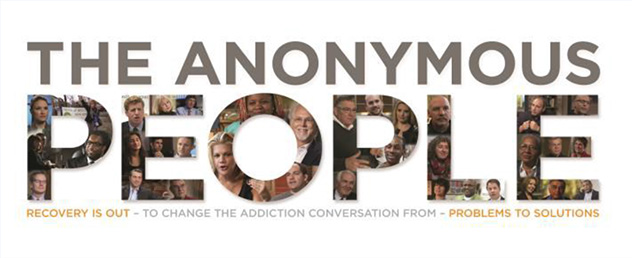The Anonymous People
Kino Lorber
Director: Greg Williams
Screenplay: Aaron Cohen, Jeff Reilly, Greg Williams
Cast: Kristen Johnston, Chris Herren, Patrick Kennedy, Tara Conner, William Cope Moyers, Jim Ramstad, William White, Laurie Dhue
Screened at: Review 2, NYC, 3/5/14
Opens: March 14, 2014
In much the way that Stephen Farber’s exciting documentary “How to Survive a Plague” deals with the struggle to get politicians involved in finding an effective treatment for AIDS, Greg Williams’s “The Anonymous People” runs with efforts to change the way we deal with folks addicted to drugs and alcohol. The overriding theme is that is in most states, the push is to arrest, prosecute and punish people (as Bush 41 states in the film) who are users of illegal drugs, presumably (though not mentioned in the movie) because demand for drugs creates a market for suppliers. (For example, also not cited by director Greg Williams, U.S. users of heroin and cocaine propel the Mexican drug market, which has already resulted in 60,000 murders by competing cartels south of our border.)
Why are we willing to spend some $50,000 to house a drug user annually in prison while for a lesser figure we can cure at least some of these people? Probably because our “lock-‘em-up-and-throw-away-the-key mentality, particularly in Red states (again, presumably), influences politicians who get votes by being tough on crime. But drug use may be technically a crime for the aforementioned reason (demand propels supply), but if so, why not change the mentality of the American people, who will then demand politicians to legislate treatment for the unfortunate people who are addicted?
Our mentality is encouraged by the stigma that so many sober people, lording over the others morally, pin on addicts. “Hey, I’m OK, but you’re not. What do I know that you can’t get into your thick heads?” What our high-minded people who may flood their body chemistry with legal prescriptions seem unable to realize is that addiction is a disease. Yes, addiction is a disease, a point made over and over until we in the audience may find it difficult not to look at our watches in dismay and be thankful that “The Anonymous People” clocks in at only eighty-eight minutes.
While Williams introduces us to lots of people who are “tired of being secretive” about their addictions and who open themselves up for Craig Mikhitarian’s camera, there is little of entertainment value in this well-meaning celluloid. What’s needed is a Michael Moore treatment. If Moore were directing, he would stop legislators in the streets and ask them point blank “Why are you voting for imprisonment instead of treatment since, after all, these people are physically ill and not moral cretins?” In investigating how General Motors threw people out of work and helped destroy Detroit’s economy, Moore knocked on the door of GM’s CEO Roger B.Smith in his “Roger and Me,” and to explore the reasons that our health system is hardly modeled against systems more efficient like those in France, Germany and Canada, he elicited humor in “Sicko” by interviewing relatives almost afraid for their lives when crossing the border into the U.S. for fear of coming down with an injury or illness.
“The Anonymous People” by contrast is virtually humorless, positioning people in 12-step groups who say all the things we already know, except that many now they say they are in recovery mode rather than “Hi, I’m Jim and I’m an alcoholic.” Instead of beating us down by repeating the theme that “society is clueless about how to deal with addicts,” Williams could have taken us to hospitals and other treatment centers to show what methods are used to get these people clean. For example, what exactly is done with drug addicts to get them off their cravings? Methadone? We don’t know. How do we clean up alcoholics? Williams gives us not a clue.
Without this information, we in the audience may have no idea how difficult or easy it is to undergo and succeed in treatment. If the politicians could see that addicts can be reformed by treatment other than simply the talking cure in the 12-step groups, maybe they would change their views. Perhaps the people in authority are cynical or believe that once an addicts, always an addict, so the best thing to do is incarcerate them—and to jail them again and again when they inevitably relapse when their sentences are over.
After sitting through passionate but uninspiring talks by legislators and those in treatment, we do get one dynamic speech by former NBA star Chris Herren, speaking to a group of young people and their parents. Anecdotes like his citing the case of a few school children sitting in the front row with similar clothing who say that they are “sober” and which caused the rest of the auditorium to laugh at them. That hits home.
Unrated. 88 minutes. © 2014 by Harvey Karten, Member, New York Film Critics Online
Story – B
Acting – B-
Technical – C+
Overall – B-

